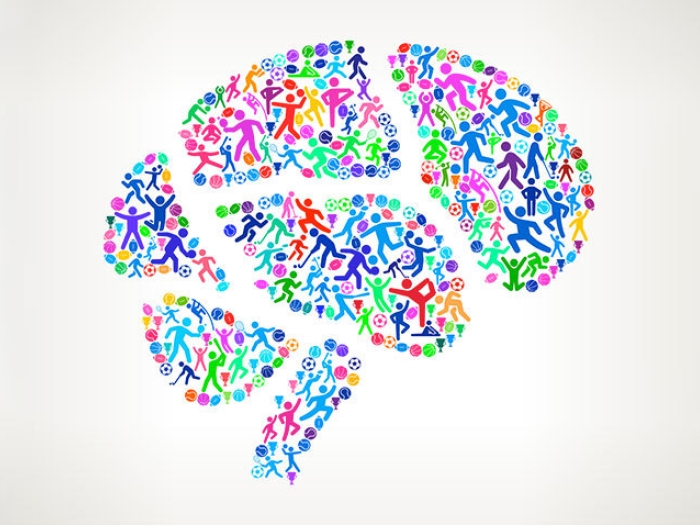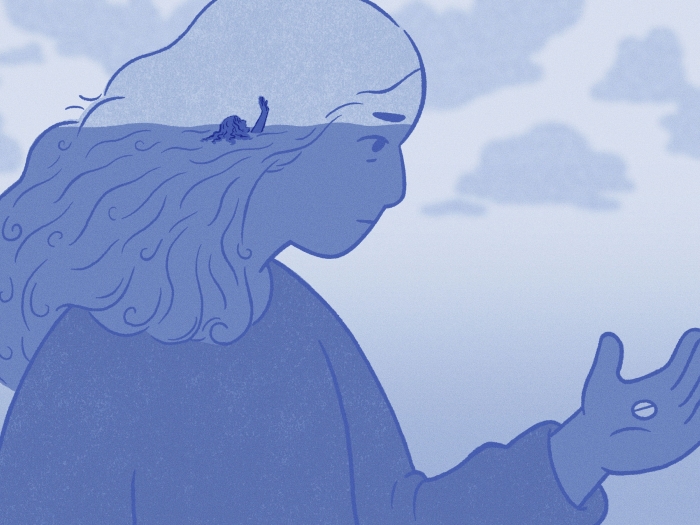Seeing, hearing or perceiving things that aren’t really there may seem like something to hide, but seeking help early can make a big difference.
12:20 PM
Author |

Maybe it's a glimpse of a person that no one else seems to see. Or hearing voices that no one else seems to hear. Or an overwhelming feeling that the innocent gesture of someone on the street actually means something sinister.
These experiences, and others that make it feel like reality is cracking, can be embarrassing, or even frightening.
They can also be the first signs that someone is experiencing a mental health symptom called psychosis.
This means they may be heading for one of several mental health conditions that include it as a symptom, such as bipolar disorder, schizophrenia or schizoaffective disorder. Or in some cases, it may reflect a medical condition.
But if someone gets proper help in the early months of having these experiences – when they can still understand that something's not right with the way they're experiencing the world – they may be able to avoid getting worse.
Since these symptoms most often start in the teen and young adult years, when the brain is changing and maturing, early action can make a major difference, says Stephan Taylor, M.D., who leads a team at Michigan Medicine that specializes in early care for psychosis.
And even if someone has already begun to experience more serious signs of psychosis, and threatening to harm themselves or others, modern therapy can still help if those around them help them get care, he says.
Taylor recently spoke about identifying the early signs of psychosis in a live video chat on the Instagram feeds of Michigan Medicine and the University of Michigan. He described the care provided by the Program for Risk Evaluation and Prevention (PREP) Early Psychosis Clinic team, and some of its research studies that are currently seeking volunteers to help uncover the roots of psychosis.
"When a person is experiencing the early phases of psychosis, they're very embarrassed and frightened," Taylor says. "They may not want to admit it's happening to them because they're afraid they're 'going crazy', and they don't understand there is help available."
Facts about psychosis:
-
Psychosis is a disruption to the way our brains process the world around us, and the narrative inside our own heads about what we're experiencing when we're alone or with others – what Taylor calls the "stories" that we constantly tell ourselves in order to navigate the world.
-
Hallucinations, hearing voices, feeling paranoia about the actions or intentions of others when no one else seems to feel that way and interpreting experiences completely differently from others can all be psychosis signs. In the early stages, people understand that what they're experiencing isn't real, but over time they lose the ability to distinguish reality from hallucination.
-
Psychosis is often stigmatized and misunderstood, which can get in the way of getting help. But research has shown that three-quarters of people who do get effective help early can experience relief from their symptoms.
-
For people who show signs of a possible psychosis, sometimes called "attenuated psychosis syndrome," only about one-third go on to develop a full-blown psychosis. However, they usually have symptoms of depression and anxiety, which can benefit from treatment.
SEE ALSO: How to Talk to Children and Teens About Suicide: A Guide for Parents
How to help someone else experiencing symptoms of psychosis:
-
Often, family and friends help identify someone who is struggling with psychosis, and suffering from their symptoms, so they're important to getting them in touch with professionals who can help.
-
Stressful life events, such as going off to college or breaking up with a significant other, can trigger psychosis. Further research is needed into why this is, but a low underlying "stress tolerance" level is often seen.
-
It's all right to mention to someone that you're worried about them, and open the door to discussing it at that point or later. You can find out if there's an early-psychosis clinic like U-M's near you, and provide information or offer to contact them.
-
If you notice signs that they're harming themselves, that's the time to seek immediate help, often by starting with contacting suicide hotline or nearby psychiatric emergency room for advice. People with psychosis have 10 to 15 times the risk of suicidal thoughts or behaviors than others.
SEE ALSO: Getting Through a Pandemic When You Have a Mental Health Condition
Treatment, support and how to help find answers for people struggling with psychosis:
-
Treatments for people showing potential signs of psychosis mostly focus on talk therapy, also called cognitive behavioral therapy. Family and group therapy are also important, and can be done virtually.
-
For people who show clear breaks with reality, antipsychotic medication can help greatly. The vast majority of people who receive these medicines experience improvement in their symptoms, but they may also experience side effects, so it's important to work with a trained professional to find the best fit.
-
Women who experienced postpartum psychosis after having a baby are at high risk of experiencing it again if they have another pregnancy, and should receive special attention during and after pregnancy.
-
A very small number of people with psychosis may be driven by their paranoia or hallucinations to act strangely in public or try to harm others. If you find yourself having to call the police because of such behaviors, make sure they understand and acknowledge that the person you're calling about has a mental health condition and needs help getting to appropriate care.
-
Just like many infectious diseases can cause a fever, psychosis is part of many mental health conditions – but what exactly causes it isn't well understood. That's why the U-M team needs people with psychosis to consider taking part in the studies they're running.
"Psychosis strikes in the years when people are just starting to be truly independent in life, work and school, which can make it especially devastating to the person and the family," says Taylor. "The process of brain maturation depends on a lot of things going right inside our brains and if they don't, things can go askew. The longer they go untreated, the higher the chance they may experience damage to the brain and be worse off even when they get treatment."
E-mail to reach the Michigan Medicine PREP clinic for early-stage psychosis or call 734-764-0231.

Explore a variety of healthcare news & stories by visiting the Health Lab home page for more articles.

Department of Communication at Michigan Medicine
Want top health & research news weekly? Sign up for Health Lab’s newsletters today!





